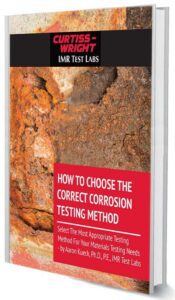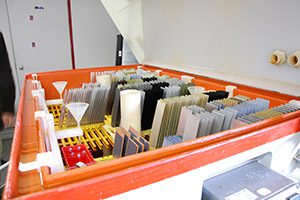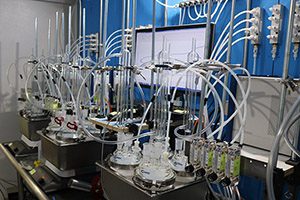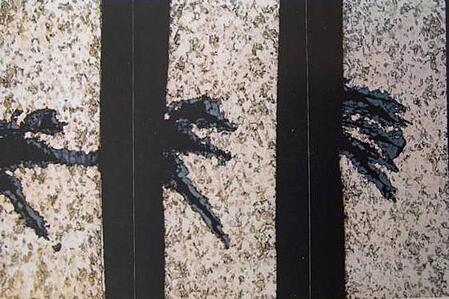During the materials selection process for an industrial application, an evaluation of different materials and how they react in a specific operating environment is required. Exposure of materials to simulated corrosion circumstances provides the following analytical data:
- Estimated Service Life/Durability
- Comparison of Candidate Materials
- Performance Expectations in Operating Environments
- Material Suitability to Final Applications
IMR operates several pieces of equipment capable of replicating natural environmental and atmospheric conditions involved in cyclic testing; modeling structure, morphology, and relative corrosion resistance.
IMR Test Labs corrosion testing analysis provides quality control by ensuring that your component surface protection application processes, such as coatings, anodizing and electroplating are being performed to specification.
Click on one of the images below for more information, or click on the button below to contact IMR's corrosion experts.
Corrosion Testing Methods
Accelerated environmental weathering methods like ASTM B117 salt spray, passivation testing, and cyclic corrosion are performed at defined intervals, utilizing temperature and humidity controls.
Electrochemical Corrosion Testing is performed to ASTM G199 through a controlled electrochemical reaction between two materials, or between an exposed surface and its operating environment.
Corrosion Testing Services- ASTM Standards
ASTM B117
ASTM G199
Types of Corrosion
Uniform or General Corrosion
The most common type, general corrosion occurs when widespread exposure to weather, chemicals, or other elements causes corrosion across the entirety of an exposed metal surface. The rate of corrosion is an important factor in selecting materials, but on occasion a manufacturer expects corrosion levels to be tolerable as opposed to preventable.
High-Temperature Corrosion
Exposure to corrosive substances at a high temperature in machines that experience combustion - furnaces or engines, for example - causes corrosion in specific types of metals that would normally be considered corrosion resistant.
Local Corrosion
Local corrosion occurs in a specific area of the metal where corrosion protection fails or is improperly applied - such as a crevice or hole - and threatens the integrity of the entire metal surface. This type of corrosion is sometimes difficult to detect until a component fails, making it especially dangerous. "Pitting" can occur even without an application failure of corrosion protectants. Its somewhat random and nonlinear corrosion patterns make it a very dangerous affectation, especially for alloys like 300 series stainless steel.
Alloy Corrosion
Corrosive elements target one component of an alloy. Alloys are created to provide specific properties and corroding one portion of the material destabilizes the entire metal component.
Galvanic Corrosion
Two distinct types of metal come into contact with one another and an electrochemical reaction causes one of the metals to corrode faster.
Environmentally Assisted Cracking (EAC)
Stress-environment interactions cause corrosion, such as stress corrosion cracking, caustic cracking, environmental stress cracking, and other subtypes. Stress, chemical exposure, pressure, vibrations, welding, machining and other factors can cause EAC.
Flow-Assisted Corrosion or Erosion-Corrosion
Corrosion caused by the flow of water or air, exposing fresh metal, which can rapidly degrade components.
Fretting Corrosion
Occurs when surfaces wear down from constant friction caused by vibrations or rubbing.
Corrosion Testing Services - FAQs
Corrosion testing evaluates how materials degrade in specific environments. Tests simulate real-world conditions to assess a material's resistance to rust, oxidation, and other forms of corrosion. Further advanced techniques can also be used for surface analysis and chemical composition assessment.
Corrosion testing is designed to simulate anywhere from a few months to several years of natural exposure. A ratio of number of hours to natural exposure time is followed and can vary depending on the material being tested and the natural exposure that is being simulated.
Corrosion testing simulates weather elements such as rain and fog, ocean spray, UV light exposure, temperature, wind-borne particles, and pollution.
Corrosion testing provides key insight into material’s susceptibility to it’s environmental exposures therefore allowing the end user to evaluate whether it is correct for the application, if it will perform as expected, or if an alternate material is more suitable.
Download Our Comprehensive Guide to Corrosion Testing

According to NACE, the global cost of corrosion is estimated to be $2.5 Trillion, which is equivalent to 3.4% of the global CDP. Through near misses, incidents, and forced shutdowns, several industries have come to realize that lack of corrosion management can be very costly and that corrosion should be mitigated through proper management.
Access our full guide on corrosion testing, which covers essential topics:
Corrosion Types: Learn about the different forms of corrosion that affect components, from pitting to galvanic corrosion.
Consideration for Manufacturers: Discover key factors manufacturers must account for when selecting materials and designing for corrosion resistance.
Industry-Specific Corrosion Testing: Understand how different industries, such as aerospace and automotive, approach corrosion testing to ensure long-term durability.





